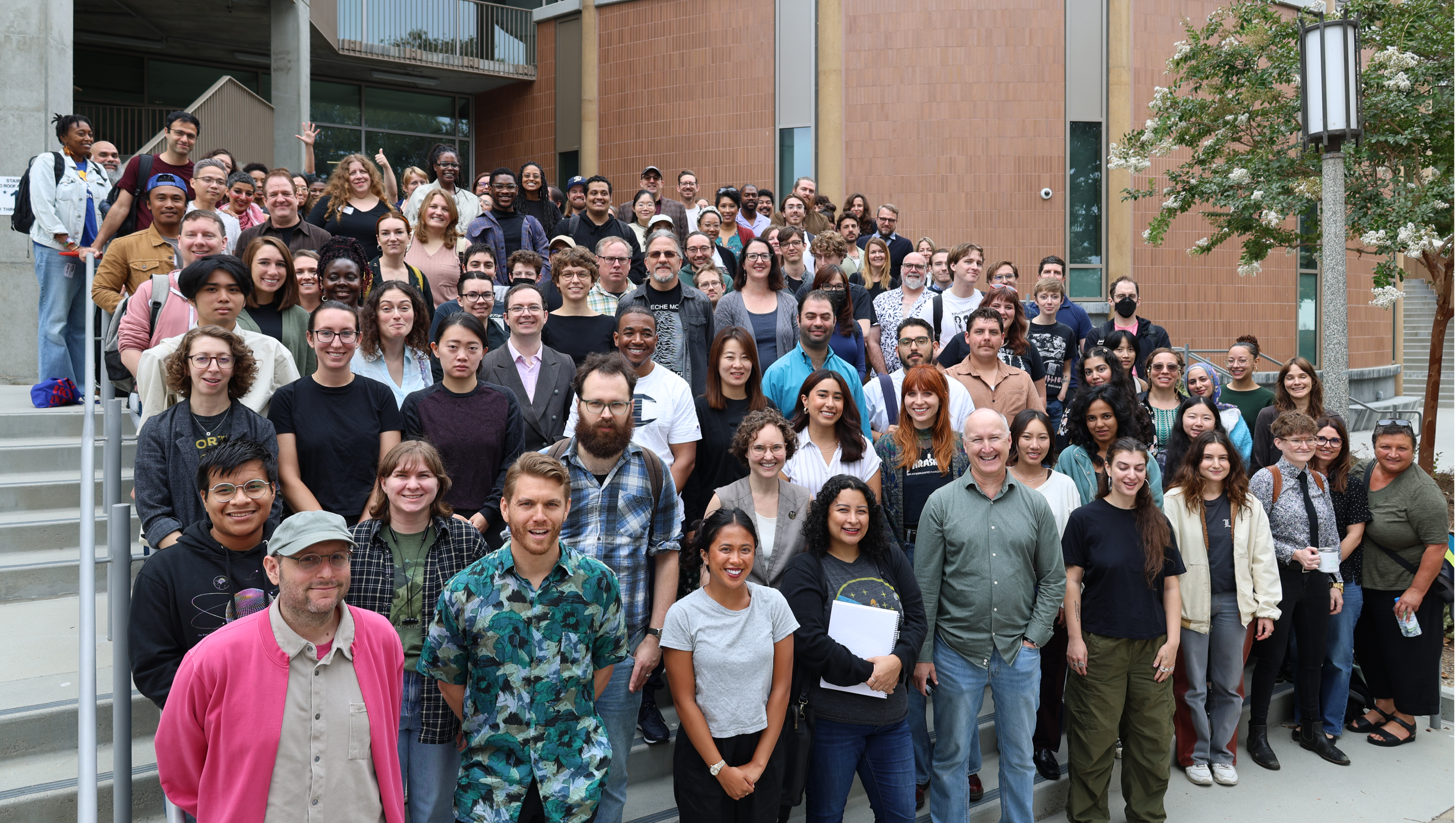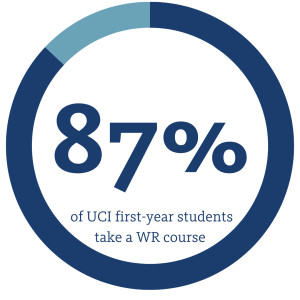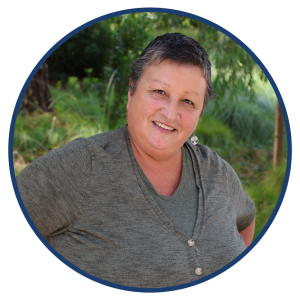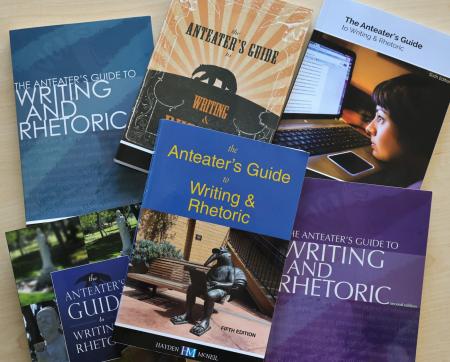
By Nikki Babri
With over 12,000 annual enrollments across more than 550 course sections, UC Irvine’s Composition Program brings humanistic inquiry and rhetorical skills to students across the university, serving as a vital bridge between lower division writing and upper division writing in the disciplines.
Born out of the national “Why Johnny Can’t Write” movement of the mid-1970s that saw universities professionalizing their writing programs, UCI’s program has evolved into a comprehensive approach to writing instruction that values students’ diverse linguistic backgrounds and prepares them for communication challenges across all disciplines.

The program is housed within the Department of English and provides undergraduates from all schools at UCI with foundational instruction in rhetoric, argumentation, genre theory, critical reading, scaffolding of the writing process, information literacy, research writing and metacognition (understanding how to think and learn).
“Our courses introduce students to the university’s postsecondary expectations for writing and literacy while cultivating humanist dispositions that motivate them to grapple with big questions and ideas about societies, cultures, and rhetorical strategies. We hope our pedagogies motivate self-reflection about who we are collectively and as individuals,” explains Bradley Queen, director of the Composition Program and associate professor of teaching in English.
Supporting student success across disciplines
While the School of Humanities represents about 13 percent of UCI’s undergraduate population, the Composition Program reaches far beyond, serving approximately 87 percent of UCI first-year students. Apart from Humanities Core and creative writing courses, the program’s writing courses are the primary pathway for students to fulfill the entry level and lower-division writing requirements.
Smaller classes provide intimate learning environments at UCI, a large public university, and enable instructors to offer personalized attention that can be crucial for developing writers and cultivating their self-confidence. Beyond just teaching writing skills, Composition instructors play a vital role in guiding UCI’s youngest students through their transition to university life, helping them adjust to the demands of higher education.

Steven Gong ‘23 (B.S. human biology, B.A.s political science and economics), UCI’s first Rhodes finalist in over a decade and a former White House speechwriting intern, found Composition invaluable in his introduction to university coursework. “Prior to Writing 39C (now Writing 60), I had never written a long-form academic paper with appropriate citations and a cohesive argument. This class provided a foundational introduction to academically arguing my points,” he says. Now a first-year medical student at Stanford, Gong credits the program with teaching him to think more intentionally about argumentative structure, giving him confidence to succeed outside of STEM.
Learning through reflection
At the core of the program’s pedagogy is an emphasis on metacognition – teaching students not just how to write, but how to understand their own writing and learning processes. This approach manifests most clearly in the program’s electronic portfolio system.

“Composition is very much about being aware of meta-processes,” confirms Composition Program Manager, Theresa Nguyen. “You’re thinking about what reading is, what writing is, how you’re doing it and how you can do it better. While it may be framed as writing, students are learning how to learn.”
In all courses, students create final portfolios showcasing their writing’s development through carefully selected artifacts, and analyzing their methods, habits of mind and strategies. These portfolios allow students to reflect on their growth as writers and thinkers, bringing these skills with them to their own disciplines. Whether writing about constitutional law or composing lab reports in chemistry, students now understand how to adapt their rhetorical strategies in different contexts.
Recent research by Queen suggests that multilingual and monolingual students perform equally well in the program’s portfolios, upending traditional hierarchies. “Approximately 75% of UCI students are multilingual and with many transferring well-cultivated linguistic resources and keen rhetorical know-how to UCI writing programs, Composition’s pedagogies, particularly its portfolios, allow students to analyze and assess their abilities, literacies, and individual histories with writing, rhetoric and communications,” Queen explains. “We hope such pedagogies motivate students to recognize their own agency as writers and foster their ability to transfer their rhetorical knowledge across different contexts in which they are learning.”

This approach has been transformative for international students like Viktoriia Sokolova, a third-year mathematics and business economics major. “This course changed my perception of academic writing,” she shares, noting that English is her third language, after Russian and Ukrainian. “It taught me how to take the scrambled thoughts in my head and find a way to express, articulate and combine themes together.” Although most of her classes do not require extensive writing, Sokolova credits the program with boosting her confidence as a writer and providing crucial skills for her role as a research assistant. For the first time in her life, she admits, she feels a true passion for the art of writing.
Building the next generation of teachers
The Composition Program’s mission extends beyond students to shape the next generation of writing instructors. With approximately 100 graduate student instructors and 51 lecturers for the 2024-25 academic year, the program serves as a vital training ground for future educators.
Differing from traditional teaching assistantships, graduate student instructors have the freedom to design courses around topics of their choice, enabling them to cultivate their teaching skills and develop unique instructional styles. The program strives to create a supportive environment where instructors feel empowered to be creative in their approaches. Classrooms are treated as active spaces of learning as instructors adjust their teaching methods in real time to respond to changing student needs.

As an Assistant Course Director and lecturer, Yolanda S. Venegas is dedicated to supporting instructors in creating engaging courses. “We are committed to adapting our curriculum, developing courses and continuing to develop as teachers to meet the needs of our diverse population of first-generation and other students,” she says.
Venegas is actively involved in mentoring both new and experienced instructors, reviewing course ideas, course site design, syllabi and course plans. While each course has a shared curriculum, Venegas emphasizes how instructors can bring their own expertise and passions into the classroom. “One of our program’s strengths is the plethora of choices our students have in what they will be reading and writing about,” she reveals. “While the subject of our courses is writing and rhetoric, the themes of our courses reflect the intellectual curiosity and creativity of our writing instructors.” Past courses have included themes from fairy tales to reproductive rights, and mass incarceration to climate change.

The program offers robust support, including graduate seminars on composition pedagogy, mentorship from experienced faculty, an online archive of shared teaching resources and opportunities to contribute to the program’s in-house textbook, The Anteater’s Guide to Writing and Rhetoric, now approaching its 10th edition. UCI stands out among its UC peers by publishing and using its own writing guide featuring instructor-provided ideas, articles and teaching materials, as well as student writing.

For Librecht Baker, a fourth-year English Ph.D. student and graduate student instructor for Writing 60, this support has been crucial. “The tangible materials and guidance have been instrumental in developing my teaching skills,” she says, sharing that her previous teaching experiences relied on learning skills “on the job,” which she found challenging. “Teaching in this program allows me the space to experiment with navigating the classroom and curriculum,” Baker explains. She notes that teaching composition has encouraged her to integrate her research interests, from identity and language to Black feminist theory, with teaching in meaningful ways for herself and her students.
Queen emphasizes the vital role Composition instructors play in bringing the program’s mission to life: “Our teachers, both graduate student instructors and lecturers, have demonstrated time and again a steadfast and idealistic commitment to the importance of literacy instruction and to the intellectual well-being of UCI’s students. It’s my aspiration that the Composition Program should enable teachers to thrive and feel valued.”
This is the second in a series highlighting foundational learning and innovative pedagogy in the School of Humanities. Read the first story about Humanities Core here.
Stay tuned for articles about Academic English and the languages and sign up for our monthly newsletter.
